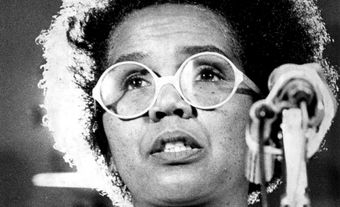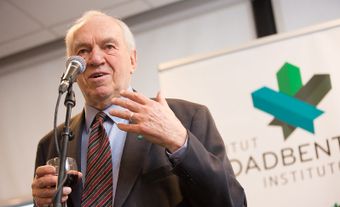Alexa Ann McDonough (née Shaw), OC, ONS, social worker, former Nova Scotia New Democratic Party leader, federal NDP leader (born 11 August 1944 in Ottawa, ON; died 15 January 2022 in Halifax, NS). A former Halifax social worker, Alexa McDonough became the first woman to lead a major political party in Canada when she was elected leader of the Nova Scotia New Democratic Party (NDP) in 1980. She served as leader until 1994 and also led the federal NDP from 1995 until 2003. She was the Member of Parliament for Halifax from 1997 to 2008. In 2009, she served as interim president of Mount Saint Vincent University and was made an Officer of the Order of Canada.
Family and Education
Alexa McDonough was the daughter of Jean MacKinnon and Lloyd Shaw, a businessman and a prominent member of the Co-Operative Commonwealth Federation (CCF). McDonough graduated from Dalhousie University (1965) and the Maritime School of Social Work (1967). She married Peter McDonough in 1966. They had two sons — Justin and Travis.
Early Political Career
McDonough first became involved in politics as a staffer for the Nova Scotia Liberal Party. She helped write the party’s social justice platform leading up to the 1970 provincial election. However, she left the party in 1974 after becoming disillusioned with then-premier Gerald Regan. She taught at the School of Social Work and worked for the city of Halifax.
Nova Scotia NDP Leadership
McDonough was elected leader of the Nova Scotia NDP in 1980. This made her the first women to lead a major political party in Canada. She sought to rebuild the NDP around urban Halifax rather than its traditional base of Cape Breton. In 1981, she stunned the Liberal incumbent to win a seat in Halifax Chebucto — the provincial NDP’s first seat on the Nova Scotia mainland. For the next three years, she was the sole NDP member and the only woman in the legislature. She was re-elected in 1984 and 1988 and eventually led the party to modest electoral gains. She represented the riding of Halifax Fairview from 1993 until 1994. She resigned as leader on 19 November 1994.
Like her father, McDonough had an interest in federal politics. However, she was unsuccessful as a candidate in the 1979 and 1980 federal elections. She was put forth by many women as a possible candidate for the federal NDP leadership in 1989, but she declined to run for personal reasons. The less experienced Audrey McLaughlin was selected as the first female leader of a federal party. Following the NDP's 1993 electoral setback, which saw the party lose official status in the House of Commons, McLaughlin stepped down as leader.
Federal NDP Leadership
McDonough was a candidate in the 1995 NDP leadership race. It was unique in Canadian federal politics because it involved a complex format of primary voting by party members and convention delegate balloting. (See also Leadership Convention.) Despite doing poorly in the primary, she was elected leader at the convention.
As with her provincial experience, McDonough was elected leader before having a parliamentary seat. Despite suggestions to run earlier in by-elections outside of the Atlantic region, McDonough chose to wait and run in Halifax in the 1997 federal election. She won the Halifax seat, easily defeating incumbent Mary Clancy of the Liberal Party. In that campaign, McDonough led an electoral resurgence. The NDP won an unprecedented eight seats in the Atlantic provinces and regained official party status with a total of 21 seats across Canada.
As NDP leader, McDonough called for strong social services and gender equity. She retained her seat in the 2000 election. But the NDP's vote slipped to 8.5 percent and its number of seats declined to 13, just barely ahead of the 12 needed for official party status in the House of Commons. Under McDonough's leadership, the NDP embarked on a series of renewal conferences. At its 2001 federal convention, delegates debated the future of the party and of social democracy.
Backbencher
McDonough announced her retirement as party leader in June 2002. With her party in the middle of a renewal process, McDonough felt that it was the right time to step aside. She was succeeded by Jack Layton on 25 January 2003.
McDonough was re-elected to her riding in 2004 and 2006. She served in the shadow cabinet as the NDP Foreign Affairs and International Development critic. She chose not to run again in 2008 and announced her retirement from politics that year.
Post-Politics Career
In 2009, McDonough was made an Officer of the Order of Canada and was appointed to a one-year term as interim president of Mount Saint Vincent University. The university made her a Doctor of Humane Letters in 2009 and renamed its women’s studies institute the Alexa McDonough Institute for Women, Gender, and Social Justice in 2013. McDonough received the Order of Nova Scotia in 2012. She died in 2022 at the age of 77 after lengthy battles with breast cancer and Alzheimer's disease.

 Share on Facebook
Share on Facebook Share on X
Share on X Share by Email
Share by Email Share on Google Classroom
Share on Google Classroom







